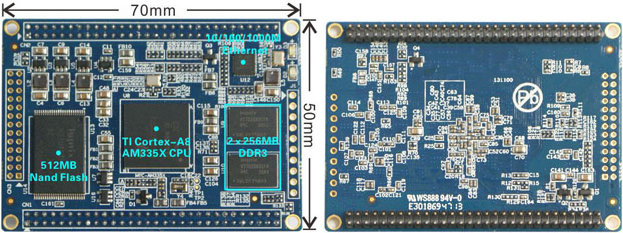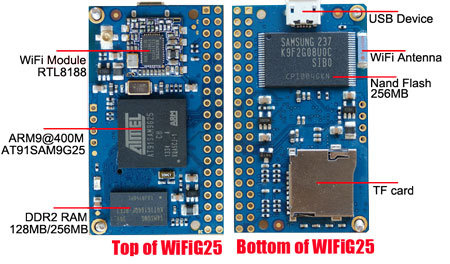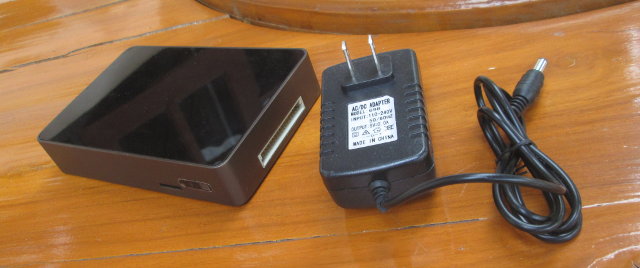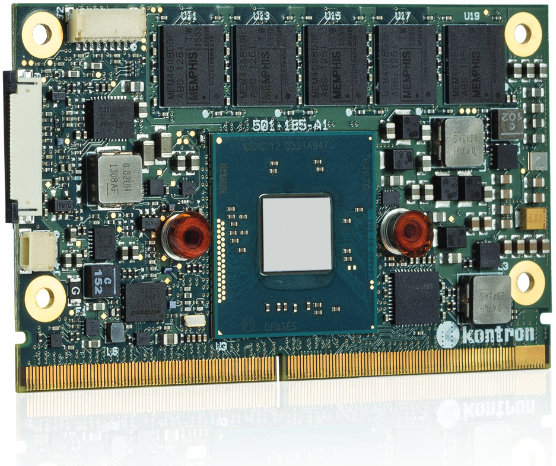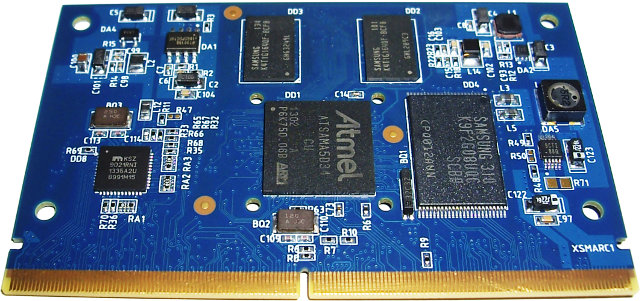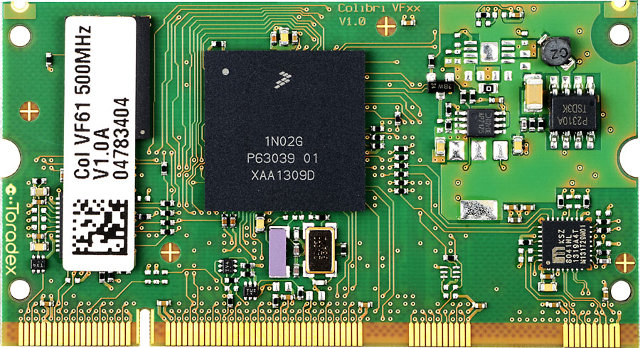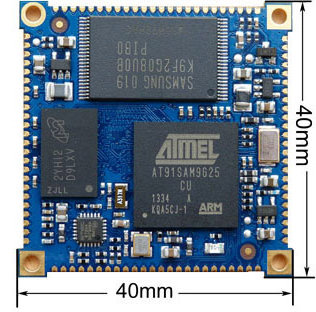MYIR has recently introduced MYD-AM335X development boards and MYC-AM335X CPU modules powered by Texas Instruments Sitara AM335x ARM Cortex A8 SoCs, (AM3352, AM3354, AM3356, AM3357, AM3358, and AM3359) that come with 512 MB RAM, 512 MB Flash, and a Gigabit Ethernet PHY. The boards and modules target home automation, industrial automation, enterprise/educational tablets, portable navigation devices and networking applications. MYC-AM335X CPU Modules MYC-AM335X CoM specifications: SoC – Texas Instruments AM3352, AM3354, AM3356, AM3357, AM3358, AM3359 ARM Cortex-A8 up to 1GHz with SGX530 GPU (AM3354/AM3358/AM3359 only) System Memory – 512MB DDR3 SDRAM Storage – 512MB NAND Flash Connectivity – On-board Gigabit Ethernet PHY Headers: 2x 2.0mm pitch 60-pin expansion connectors to connect the SoM to a baseboard with the following signals: 2x USB2.0 OTG ports, 6x Serial ports, 2x I2C, 1x SPI, 7x ADC, 2x PWM, 3x SDIO 1x 2.0mm pitch 26-pin expansion interface 1x 2.54mm pitch 10-pin expansion interface Misc – […]
$30 CoreWind Tech WiFiG25 SoM Features Atmel SAM9G25 ARM9 Processor and a Wi-Fi Module
After their Aria G25 clone, called CORE9G25, CoreWind Tech has now launched a new SoM, WiFiG25, also powered by Atmel SAM9G25 ARM9 processor, but this time with a WiFi Module based on Realtek RTL8188, and up to 256 MB RAM, 256 MB Flash. Here are the specs of this system-on-module: CPU – Atmel AT91SAM9G25 ARM9 @ 400Mhz System Memory – 128 or 256 MB DDR2 Storage – 256MB NAND Flash, micro SD card slot Connectivity – WiFi Module with internal antenna 2x20Pin 2.54mm expand interface (through holes) with access to 2x USB host ports, 3x UART, 1x I2C, 1x SPI, 6x PWM, 27x GPIOs, and 4x 10-bit ADC Line level – TTL 3.3V Misc – User LED Power supply – 5V Dimensions – Size: 50.80 x 30 mm Weight – 5g Temperature range – Commercial: 0 to 70 °C, or industrial: -20 to 85 °C The company provide Linux 3.6.9 for the […]
ITEAD Studio IBOX AllWinner A20 mini PC Review
ITEAD Studio IBOX is an AllWinner A20 based mini PC currently running Android or Linux distributions currently featured on Indiegogo. I’ve already written about IBOX in a separate post, where you can get all the specifications, but the company has also sent me a unit (engineering sample) for review. Since the system is still in development, and it’s mostly a development platform, I won’t do a review with video testing, system performance, etc… as usual, but rather show the progress and current issues in terms of hardware and software, and I’ll also mention documentation, and shortly try Android 4.2 (pre-installed) and the Debian 7.0 image released by the company. IBOX Unboxing Pictures I’ve received the device in a cartoon box containing the device itself and a 9V/2A power supply. If you are or become a backer on Indiegogo you’ll also receive an add-on board providing access to a SATA connector, […]
Kontron SMARC-sXBTi is a SMARC Module Powered by Intel Atom E3800 Series SoC
Kontrol has unveiled a computers-on-module based on the SMARC standard, previously ULP-COM, based on Intel Atom E3800 “Bay Trail-I” SoCs with up to 8GB LPDD3 memory, up to 64GB SSD, and support for various interface. After having released SMARC modules based on TI, Freescale and Nvidia last year, the company claims their SMARC-xXBTi is the first ever x86 CoM compatible with SMARC. SMARC-sXBT(i) specifications: SoC – Intel Atom E3800 “Bay Trail-I” with Intel Gen 7 Graphics System Memory – Up to 8GB DDR3L-1067/1333 (1.35V) with optional ECC Storage – 2-32 GB eMMC (SLC), 4-64GB for (MLC), 1x or 2x SATA 3Gb/s, 2x SDIO interfaces Display HDMI 1.4 up to 2560 x 1600 @ 60Hz 18/24-bit single channel LVDS up to 1366 x 768 (Optional eDP to have higher resolutions) Connectivity – Gigabit Ethernet (Intel Springville I210) USB – 1x USB 3.0 (via AFB), 2x USB 2.0, and optional USB OTG. […]
AXONIM Devices Announces AXSY-SoM-SAMA5D3 System-on-Module Powered by Atmel SAMA5D3x Cortex-A5 Processor
AXONIM Devices, a company based in the republic of Belarus, announced AXSY-SoM-SAMA5D3 System on Module (SOM) powered by Atmel SAMA5D3x Cortex-A5 processor. This SoM targets industrial applications and supports low power application such as POS-terminals, handheld devices, medical devices and more. Here are AXSY-SoM-SAMA5D3x SOM specifications: SoC – Atmel ATSAMA5D3x ARM Cortex-A5 processors @ 536 MHz (SAMA5D31, SAMA5D33, SAMA5D34, SAMA5D35, or SAMA5D36) System memory – 128/256/512 MB DDR2 Storage – 256MB/512MB/1GB NAND, 1 to 8MB SPI Flash Interfaces: 6x UARTs, 3x I2C, 2x SSC (for I2S Audio CODECs), 2x SPI, 2x CAN 2.0B 1x USB OTG 2.0 High Speed, 3x USB 2.0 High Speed Host 1x 10/100/1G Ethernet (Gigabit PHY on board), 1x 10/100 Ethernet (with IEEE1588v2 support) 1x Memory BUS (EBI) LCD 24 bpp TTL 3x MMC/SD 4x PWM 1x RTC 1x SMD (SmartHSFe Modem Device) – Conexant CX20548 with SmartDAA technology support Power supply – 3.3V / 5V […]
Crowdfunding Report 2013 on CNXSoft Blog
Crowdfunding has really took off in 2013, with sites like Kickstarter and Indiegogo, as they enable start-ups to launch new and innovative products, and some established, even large companies, I’m thinking Canonical with Ubuntu Edge here, have also tapped into that market, actually shifting part of the risks from shareholders, to customers / individual funders. In this post, I’ll go through all the crowdfunding projects, 16 Indiegogo and 25 Kickstarter campaigns, featured on cnx-software.com between the beginning of December 2012 till the end of November 2013, to find out which ones have been a stellar success in terms of funding and on-time delivery, and those that have failed in one way or another, with some being close to looking like scams. There was a wide range of products with dealing home automation, the Internet of things, wireless Arduino compatible boards, Linux development boards, media players and more. Let’s go straight […]
Toradex Colibri VF50/VF61 SoMs Powered by Freescale Vybrid SoCs Sell for as Low as 19 Euros
Toradex Colibri VF50 and Colibri VF61 are system-on-modules respectively powered by Freescale Vyrbrid VF5xx Cortex A5 SoC and Vybrid VF6xx dual core Cortex A5/M4 SoC, which are part of the company’s Colibri ARM computer on modules. Toradex Colibri VF50/VF61 specifications: Processor VF50 – Freescale Vybrid VF5xx (MVF50NN151CMK40) ARM Cortex-A5 @ 400MH, 1.5MB SRAM VF61 – Freescale Vybrid VF6xx (MVF61NS151CMK50) ARM Cortex-A5 @ 500MHz, Cortex-M4 @ 167MHz, 1.0MB SRAM, and multiple hardware accelerated security features listed below. System Memory VF50 – 128MB DDR3 (16-bit, no ECC), or 64MB DDR3 with ECC (8-bit, ECC) VF61 – 256MB DDR3 (16-bit, no ECC), or 128MB DDR3 (8-bit, ECC) Storage VF50 – 128MB NAND flash VF61 – 1GB NAND flash Interfaces via the 200-pin SO-DIMM edge connector (X1): LCD RGB (24-bit), up to 1024 x 768 4-wire or 5-wire resistive touch Audio – I/O (VF61 only), SPDIF In and Out, I2S/AC97 compatibl Ehanced Serial Audio […]
$30 CoreWind Tech CORE9G25 SoM Features Atmel SAM9G25 (ARM9) Processor
CoreWind Tech CORE9G25 is a system-on-module based on Atmel SAM9G45 processor with 128 to 256 MB RAM, and 256 MB Flash available in commercial and industrial temperature range. If the picture below seems familiar, it’s because it’s a clone of ACME Systems’ ARIA G25, and the company went as far as more or less copying most of ACME Systems’ Aria page on their own domain. Here are CORE9G25 / Aria G25 specifications: CPU – Atmel AT91SAM9G25 (ARM9) @ 400Mhz CPU System Memory – 128MB or 256MB DDR2 RAM Connectivity – 10/100 Mbit Ethernet interface USB – Up to 3 USB 2.0 host ports (2 Hi-Speed, 1 Full-Speed) Interfaces: Up to 6 serial lines Up to 2x I2C buses Up to 2x SPI buses Up to 60 GPIO lines Up to 4x A/D lines @ 10 bit Dimensions – 40 x 40 mm Operating temperature range – 0 to 70 °C […]


